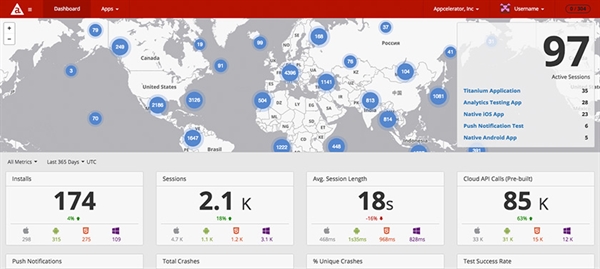
An often overlooked piece of a mobile app strategy is analytics and usage measurement. Be it a consumer facing app, or an enterprise app for internal customers, mobile app management must include analytics.
Why the need for a mobile app development project to implement analytics? Consider the following: after all the time and effort in designing, developing and testing your mobile app, upon releasing to the the app store or to internal enterprise customers, do you know:
- How many active users do you have (not just installs)?
- Where are they located?
- What parts of the app are the using? Better yet, what part of the app is being ignored?
- How many users are completing a business goal within the app? A signup, sale or conversion? Where are they dropping off in the event funnel?
Don’t know the answer to these questions, but need to find out? Before you go too far on your mobile app project planning, reach out to us to discuss your project and how analytics can measure the business goals of your consumer or enterprise app.
Mobile Analytics Options
There are many services for collecting and analyzing mobile analytics. Below is a list of services we have worked with, along with some details on why it might be useful for your mobile app development project.
Any company that currently uses web analytics is most likely already using Google’s powerful analytics platform. Using it for mobile is a great progression, as they are already familiar with the platform.
Google Analytics for Mobile is now part of Google’s Firebase SDK. Apps already using Firebase are nearly good to go. Otherwise, there is some extra steps required to set up Firebase over other analytics SDKs.
Appcelerator Platform Analytics
We work with the Appcelerator Platform a lot, and using their analytics is a great fit, as it already enabled in Titanium apps. Extending it to track additional metrics is straightforward, and the the dashboard (shown in the image above) is pretty easy to use for mobile app owners.
As with the previous two platforms, using Kinvey’s analytics tool is handy if the app is already using the Kinvey platform as a backend. Kinvey offers both a standard and premium analytics service.
Amplitude is great for mobile app projects that already have a mobile app backend, be it internally developed or an MBaaS that is lacking an analytics services. Another benefit of Amplitude is their focus on data accessibility, enabling customers to work with the raw data, handy for research or data analysis focused customers.
Conclusions
There are many mobile app analytics services available, and these are just what we’ve used and can recommend. In many cases, the decision on which analytics tool to use is determined by the backend service the app is using. If you would like to discuss your mobile app development and analytic needs, please feel free to contact us today.